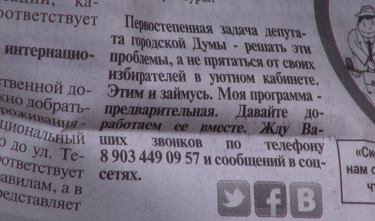Earlier this week, a judge in Krasnodar disqualified [ru] a politician running for city council, after determining that his campaign materials infringed on the copyrights of three popular Internet social networks: Twitter, Facebook, and Vkontakte. What exactly was this man’s crime? He ran a black-and-white newspaper advertisement that included the three websites’ logos, indicating that voters could find more information about his campaign online. (He was also convicted of baiting voters with implied promises of free legal aid.)
The guilty party, one Gennady Ufimtsev, is a member of the opposition party Just Russia, and he joins Anatoly Ovechko, a fellow city council aspirant from the Communist Party, whose candidacy was also canceled by Judge Viacheslav Riadnev of the Leninskii Raion Court [ru] in Krasnodar. (Ovechko allegedly broke campaign finance laws by spending a whooping one thousand dollars [ru] over the mandated ceiling.)
Though it may be hard to believe, Ufimtsev’s newspaper ad might very well violate the strict letter of Twitter’s brand display policy. Twitter offers its official trademark in four different color schemes (this is the company’s third design, adopted in June 2012, featuring only a minimalistic cartoon bird silhouette). In Ufimtsev’s campaign materials, he published the cartoon logo from Twitter’s second design, which Twitter’s current guidelines technically define as a “don’t.”
While Ufimtsev has Judge Riadnev to thank for his conviction and elimination from city council contention, he undoubtedly would also wish to extend his gratitude to rival candidate Rinat Galliamov, a member of the new party “Cities of Russia” (a government-friendly vehicle, probably designed [ru] to spoil the solidarity of the opposition vote). Galliamov is the man who brought the suit to court. And the “enemies list” doesn’t end there! In a March 6 blog post [ru] on LiveJournal, Ufimtsev singled out Maxim Burlachko, a United Russia candidate running for city council, who happens to be the son of Krasnodarskii krai’s elections commission chairman.
If Judge Riadnev was indeed trying to clear the Krasnodar city council election of any pesky opposition candidates, he appears to have acted a day too soon. As it happens, the verdicts against Ufimtsev and Ovechko don’t take effect until March 11—one day after the city council vote [ru]. (It appears that the plotters failed to account for the International Women's Day holiday on March 8.) In other words, both candidates can currently stand for election this weekend. If either wins a seat, however, the election results would be disqualified as soon as Riadnev’s ruling takes effect on Monday.
Not ones to be discouraged, Krasnodar’s legal officials are expediting the appeals process (though Ufimtsev and Ovechko have yet to petition for one), sending the original verdicts to a higher court for consideration tomorrow, on Saturday, March 9. This will allow another judge to uphold Riadnev’s ruling and keep the two candidates off the final ballot.
In connection with this case, online portal The Caucasian Knot spoke [ru] to local GOLOS representative and human rights activist Mikhail Veligodskii, who pointed out that it’s only natural for competing politicians to do everything they can to weaken (or even remove) their opponents. The real challenges, he suggested, are Russia’s “strict electoral laws and problems with the independence of judges.” Heading to the polls on Sunday, Krasnodar voters will have to ask themselves who among the remaining candidates offers solutions to these and other issues facing the region.









2 comments